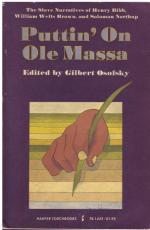|
This section contains 8,136 words (approx. 28 pages at 300 words per page) |

|
SOURCE: An introduction to The Travels of William Wells Brown, Markus Wiener Publishing, 1991, pp. 1-20.
In the following essay, Jefferson contextualizes Brown's literary accomplishments by providing background information on his life.
I
William Wells Brown, the black nineteenth-century man of letters, is best known for the Narrative of William Wells Brown, A Fugitive Slave (Boston, 1847), a once popular and now classic autobiography;1 Clotel; or, The President's Daughter (London, 1853), the first novel published by an African-American;2 and several works of history, among them The Rising Son; or, The Antecedents and Advancement of the Colored Race (Boston, 1873), the most important book by a black historian until George Washington Williams' History of the Negro Race in America, 1619-1880 (New York, 1883). Brown's other writings include a compilation of anti-slavery songs, published lectures, a five-act play, and English and American editions of the first travel sketches published by a black American.
Brown's writings...
|
This section contains 8,136 words (approx. 28 pages at 300 words per page) |

|


